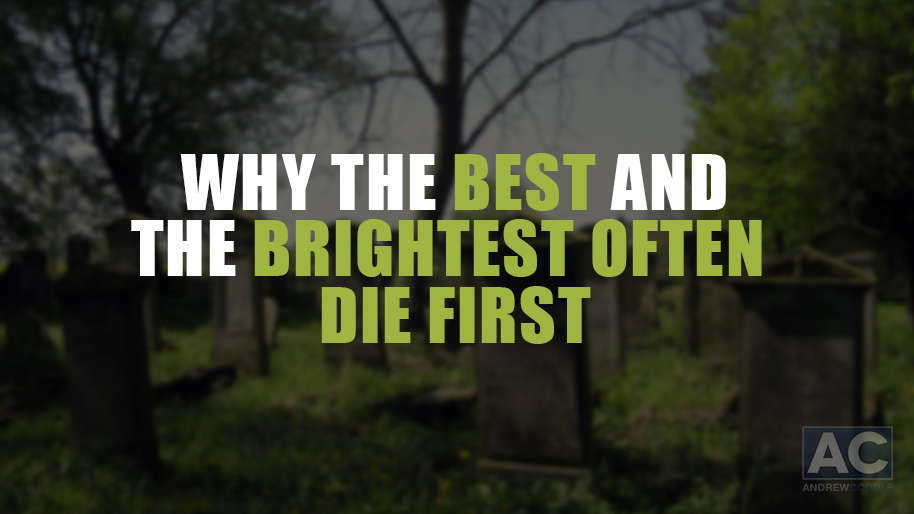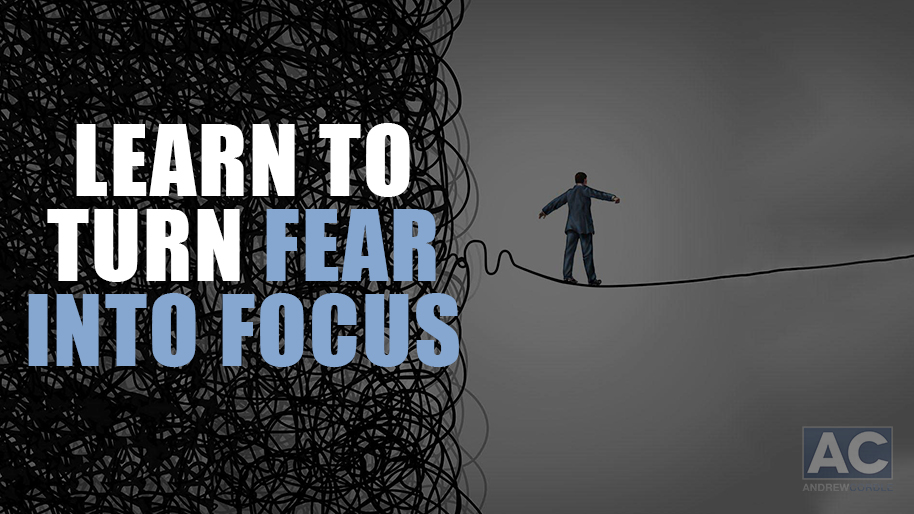Blog
DIY: How to Flip a House – Kitchens 1 of 15 (Video)
December 16, 2014When we’re teaching investors how to flip a house, the importance of the kitchen rehab cannot be stressed enough. Kitchens sell homes! In this video, Andrew shows you how to flip a house and rehab that kitchen so the end result is a top-notch, eye-catching product! Our video library helps any investor learn how to flip a house. www.andrewcordle.com ...
read moreWhy the Best and the Brightest Often Die First
December 16, 2014Laurence Gonzales tells the story of Captain James Gabba, an Army Ranger. He drowned when he was taking down the upper Gauley river in West Virginia in his raft. He hit a rock and it knocked him out of the raft. The commercial guide was also knocked out of the raft and tried to rescue Gabba. He playfully pushed him away and laughed. Perhaps he was thinking that his Army Ranger training was many times more dangerous and stressful than this minor upset. Consequently, Gabba floated downstream into a massive rock blocking the river flow, and was pulled under by the power of the current and drowned. A typical civilian with no advanced training would have welcomed the guide’s rescue attempt and most probably lived to tell quite a story. Captain Gabba perhaps saw the guide’s rescue attempt as unnecessary for such a well-trained “stud” as he. His family attended his funeral and had only a tragic story to tell. Ranger training is some of the most rigorous and demanding that the Army provides. Successfully completing the grueling 8-week course can give the soldiers tremendous confidence and know-how in survival skills under extreme conditions. Yet, in Ranger training, having to be rescued equates to failure. Self-sufficiency is rewarded. Rangers lead the way; they don’t need to be rescued! Now, all things considered, physical and mental training should never be minimized; however, some of the very training in business schools, universities and military programs, while teaching extremely valuable information and technique, also insidiously teach a confidence that can be most counterproductive in survival situations. An MBA does not teach one to cope with a shocking divorce. When you are alone in a business failure, the degrees or awards hanging on your wall do not provide any comfort or remedy. In fact, all that training seems to mock you in your failure. How could a guy/gal like you with all that good training fail so miserably or be so confused in life? Let’s examine more carefully this seeming paradox in survival: 1. Survival requires both faith and works. By faith, I’m referring to that inner confidence that keeps us believing we will survive and ultimately be successful. And when we stop believing that we can, we don’t. And when we don’t, we die. But faith is more than believing we will survive; faith should also motivate us to do our part to rescue ourselves. Believing that someone will rescue us is often merely a false hope that will bring depression when it doesn’t happen. Whereas, faith can give us the confidence to look for ways we can hike out of our woods. Faith sees itself surviving, so it does those things that a survivor would do. 2. Survival ultimately depends on outside help. Juliane Koepcke – the 17 year-old girl who hiked from a plane crash to a stream to a river and eventually to a hunting cabin – had the faith to believe she could walk out of the jungle; yet, she was eventually rescued by the hunters who got her to a hospital. Aron Ralston, who was forced to cut off his arm to survive a tragic hiking accident successfully stopped the bleeding, overcame the shock and hiked to a road, but he...
read moreThe Custom House Key and Your Brand
December 16, 2014Let’s take a few moments and discuss one of our more unique branding items – The Ann Lee Interior Custom House Key. The founder of Starbucks, Howard Shultz once stated that it’s “the small details that matter“. With that in-mind, one of the initial things we realized is that the first item that a potential buyer touches are the house keys. When I first started out in real estate investing, I noticed that most investors would take all of the property-related keys and place them in the lock-box. From the get-go, this is something that I’ve tried to avoid at all costs. I have learned that having that many keys in the lock-box can be frustrating. It can also be confusing and can have a negative affect on the potential buyer. Especially in states where weather is extreme during certain seasons. We place one key in the lock-box – the front door key. We want it to be quick and easy to enter the home, hence, we place only one key in lock-box…and its a custom AnnLeeInteriors.com key. Well, after a while, other investors began mirroring us in that they started placing only one key in their lock-box. So, our competition had finally caught-on! After some quick thought and discussion, I figured out a new way to one-up our competitors and stand-out. Sure, we still only place one key in the lock-box, but we made it into a custom AnnLeeInteriors.com key! We even brand our keys! Our custom keys cost us about $1.75 each. Now you tell me – is $1.75 worth it for something that might just make the difference in your sale? That answer is a resounding “yes”! Since we want our buyers to not only remember us, but to pass our good name on to others, we ensure that every single house-related key is a customized AnnLeeInteriors.com key upon closing. Also, before you hand the keys over for good, ensure that all the locking mechanisms on the door are working flawlessly. Make sure that the keys slides in and works smoothly. Ensure that the locks line-up perfectly. You want the locks to work perfectly as this all goes back to the buyers experience. The entire experience should be just like the customized key and locks – everything is smooth and easy! ...
read moreLearn to Turn Fear into Focus!
December 16, 2014James Stockdale is best known in recent decades as the vice presidential candidate in Ross Perot’s failed bid for the White House back in 1992. But what he is best known for is his surviving over seven years of daily torture as a POW in Vietnam. He was shot down in 1965 and was ultimately released after negotiations in 1973. Stockdale once observed, “You have to practice hurting. One should include a course of familiarization with pain. You have to learn to take a bunch of junk and accept it with a sense of humor”. But survival is not about being a hero. Author Laurence Gonzales writes, “Survival is not about bravery and heroes. By definition, survivors must live. Survivors aren’t fearless. They use fear – they turn it into anger and focus.” He continues, “A lifetime of experience shapes us to meet or be crushed by such challenges as a bad divorce, the shattering of a career, a terrible illness or accident, a collapsing economy, a war, a prison camp, the death of a loved one, or being stranded in a jungle”. So now, let’s see if we can discern some ways to build that familiarization with pain and thus survive: First, one of the most potent survival truths is this: Find another person trying to survive and help them to safety. Helping another removes one from the self-focus of fear, pity, and pain. You move from being a victim to being a rescuer and that helps focus your energy on a plan to get you out of your own deep woods. It’s the old adage, “if I push your car to the top of the hill with my car, my car gets to the top of the hill as well”. Gonzales later states, “Doctors and nurses often survive better than others because they have someone to help”. We certainly may not feel like helping another when we are suffering our own pain, but it will actually help relieve a significant portion of our pain if we help another with theirs. Living a life of helping others by pausing our own journeys to play the good Samaritan role may be a true life-saving habit. Emergency conditions usually bring out the person that we have been becoming all along. A selfish “me-first” attitude will only stunt our survival chances, whereas an others first attitude could give us the right attitude in a crisis to survive it. Secondly, survivors must find a purpose in their survival. Quite often, that purpose is living for someone they deeply love. During the crash of 2008, a close friend went through a terribly dark depression. It was a darkness that enveloped him each morning and suffocated light and life out of him all day. After months of mentally chasing his tail as a dog does his own, he was fatigued from attempting to recover. In a time of great despair, he did what many do. He chose to think that he was of no value to anyone and that death may end the pronounced pain of depression. He put a gun to his head, cocked the hammer, and began squeezing the trigger. But then an image of his little son discovering his dead father with his brains splattered on the...
read moreHow to Identify Good Business Partners
December 16, 2014We continue our on-going discussion regarding “business partnerships”. Last time, we talked about how to identify a potentially bad business partner. This week, our focus is “How to identify GOOD business partners”. As I mentioned previously, there are two types of business partners. Those there to make the business succeed and those who are there to make themselves succeed. Obviously, your goal should be to find the former! I have partnered with several people in the past. I’d rather you learn from my mistakes then make your own and learn the hard way! Below, I’m going to list several positive attributes that you should look for in a potential business partner. The Positive: 1. A business partner that’s willing to take a pay cut or no pay when the company is first started. Unlike the “bad” partner to avoid, this partner is willing to make significant fiscal risks in order to grow and evolve your business. After all, most people who partner in business are doing it to both grow the company and the bottom line. More often than not, new partnerships require that all partners make some sort of financial sacrifice. If a potential partner is willing to make tough personal financial sacrifice from the get-go, you likely have a “keeper”! 2. A potential business partner who is willing to invest their own personal monies to grow the business. Or at least help with increased costs. One former partner of mine would demand a large portion of profits. Yet he never put one penny of his own money into company coffers! Avoid profit leaches! If you have a potential partner that has no qualms investing their own money into the company, ensure that they’re on your “shortlist”! 3. A potential business partner that doesn’t require or at a minimum doesn’t stake their partnership on your hiring of their family, friend or spouse. Most small companies employ friends, family or spouses. If a potential partner brings this up right-away or their decision hinges on whether or not you’ll hire their friend, family, or spouse, then they probably don’t have the best intentions in-mind. A good partner is interested solely in growing the business and the bottom line. Not employing those closest to them. 4. A potential business partner who is humble! Trust me, avoid the narcissistic peacocks! They will destroy your reputation and will likely distract potential clients with their selfish focus. There is nothing more satisfying than someone who is great at their job. Yet you never hear them promoting or slapping themselves on the back. Humble people are better learners and make far better partners! 5. A potential business partner who is emotionally and mentally stable. I swear, one of my old partners was literally off his rocker and needed professional help and medication. Find a potential partner who is stable and has control of their temper. You do not want your potential partner to be one who may end up losing business. Also one who may end up hurting someone physically because they’re “a few bricks shy of a full load”! You want a partner, not an extra child or family pet! Hopefully, you’re taking these recommendations to heart! Join me next time when we continue our Business Partnership...
read more

































